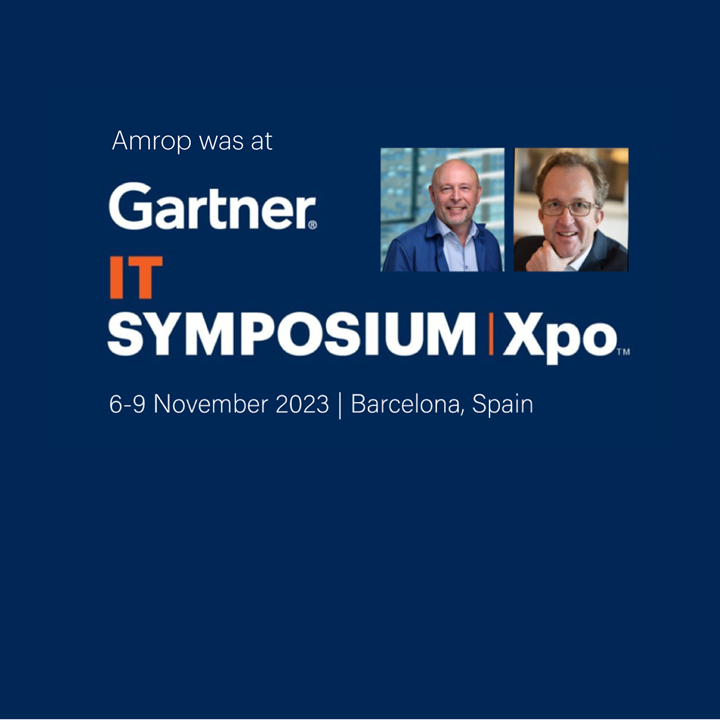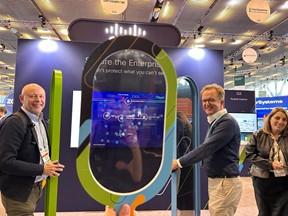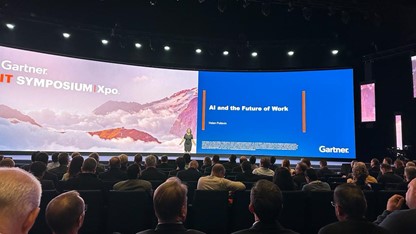Amrop at Gartner 2023 - Top Takeaways
Job Voorhoeve, Partner at Amrop the Netherlands and Leader of Amrop’s global Digital Practice, and Christian Keyser, Partner at AmropCivitas in Hamburg, took part in the Gartner IT Symposium Xpo™ 2023 conference - the 'World’s Most Important Gathering of CIOs and IT Executives', which took part November 6-9 in Barcelona. They represented Amrop as strategic business advisor and connected with the world-class lineup of guest keynote speakers, experienced practitioners and technology experts.
The event provided a unique chance to be immersed in the latest hot topics and later share their top takeaways and insights with the whole Amrop team and network.
Read on to find out about the main takeaways.

Unleashing AI Possibilities
Reimagining leadership in the context of new knowledge and technology
Nowadays it's crucial to focus on everyday AI, game-changing AI, and become AI-ready as an organization. For everyday AI, start with the human-machine relationship, choose your AI ambition, and identify your everyday AI opportunities. For game-changing AI, be the executive AI guide, decide on your optimal investments, and brace for shockwaves. To be AI-ready, align your lighthouse principles with your values, choose which data needs to be AI-ready, and prepare for new attack vectors.
"Undoubtedly, unleashing the possibilities offered by AI has to be mentioned as an overarching theme of the conference which many talks and workshops explored in detail, offering lots of know-how and pointing out various implications," says Christian Keyser. "At the same time the direct implications of new possibilities tell us that even in an AI world, it’s all about the people, leadership and constant developing and adjusting. For example, there are a lot of CIOs reporting to CFOs, which means it's crucial that the CFOs are aware of the possibilities offered by AI and their potential impact on the organization. CFOs should also be instrumental in defining a broader strategy both for finance and for technology, when it comes to how AI will impact it. Thus, the CFO should be deeply connected to their CIO to both improve their own organization, but also the overall business model of the organization. It's not only about budget restrictions - the potential of AI needs to really be evaluated, and a better view is needed on AI-related investments, because, while at the investment phase we might not predict the outcome precisely, the learning in the case of AI definitely offers more benefits than risks."

"The CFO needs to have a much better understanding of the work of the CIO these days, and their capabilities and vision regarding AI and how it can impact the business model," states Job Voorhoeve. "This is particularly important when it comes to PE firms - they need to focus on having the right kind of leadership teams in their portfolio companies. The leaders in these portfolio companies should demonstrate curiosity to learn and have the capability to pick up knowledge and know-how quickly when it comes to AI and new technology. And, when it comes to reporting structure, the organization needs to make sure that those having the most exposure and knowledge have a possibility to communicate efficiently and impact decisions."
Prioritizing cybersecurity for new threats
A human-centric design needs to be used in order to strengthen your program and optimize human potential. Customers need to be engaged in privacy, and zero-trust initiatives need to be combined with other preventive strategies. Likewise, a closer relationship needs to be established with your board to improve trust and support, and align cybersecurity to business goals. Outcome-driven metrics measure cybersecurity value, and protection-level agreements establish operational targets, cost, and defensibility.
"The talks, workshops, and presentations around cybersecurity have been extensive and content-dense, demonstrating how crucial and indispensable it is in today's landscape," says Voorhoeve. "The pandemic’s acceleration of digital transformation, cloud adoption, the rise of advanced technologies that interconnect assets and, therefore, introduce new vulnerabilities, increase of cybercrime, and the ubiquitousness of AI-powered technology, has clearly illuminated the need for businesses to think about cybersecurity very differently. It is no longer just an IT issue: it is a strategic imperative for business and a core area of risk, no least because we really need to be careful about the AI tools that we use."
Likewise, it often boils down to people, leadership and collaboration, which cannot be stressed enough. "Many organizations have pursued large-scale digital transformation in the past years and are now under even more pressure to make consequential business decisions - not only at a faster pace, but also with much more attention to the organization’s information, cyber, and technology security," Voorhoeve continues. "In this context the tension between the priorities of enabling business objectives through technology and maintaining a robust security posture can become an especially challenging factor, which needs attention and cannot be left to its own devices."

For more information, please contact Job Voorhoeve at Amrop in the Netherlands, Christian Keyser at AmropCivitas in Hamburg, or the Amrop Digital Practice members in your country!
